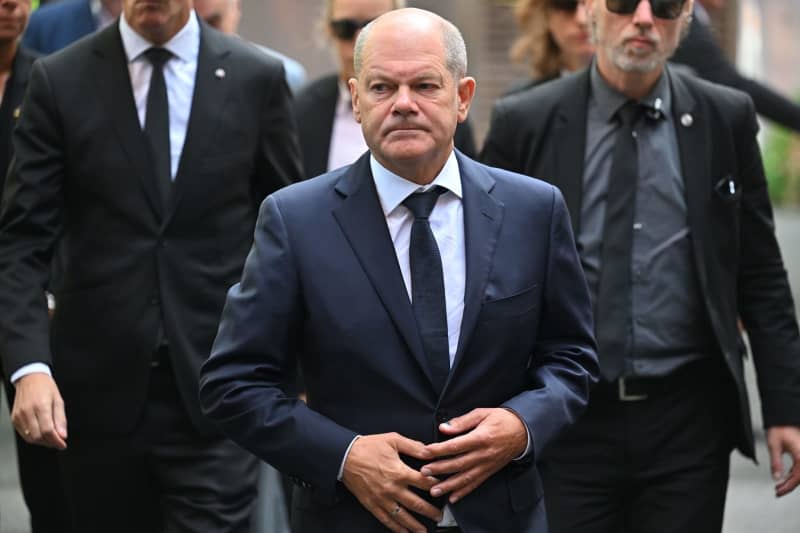German Chancellor Olaf Scholz on Monday visited the western city of Solingen, three days after a deadly stabbing attack which shocked the country and reignited debates on Germany’s migration policy and sharper knife laws.
Speaking after laying a white rose at the crime scene, Scholz said he was “furious,” calling for the suspected perpetrator – a 26-year-old Syrian man who has been remanded in custody – to be punished.
“We feel deeply what a terrible crime this is. It moves us all, and none of us will forget it,” Scholz said.
“This was terrorism. Terrorism against us all, threatening our lives, our sense of community, the way we live,” the chancellor added.
The attack on Friday evening came during a festival celebrating the city’s 650th anniversary.
Two men, aged 67 and 56, and a 56-year-old woman were killed while eight others were wounded, four of them seriously, according to the local police chief.
A judge issued an arrest warrant for the Syrian man on suspicion of murder and membership of the Islamic State terrorist group, among other charges, the Federal Public Prosecutor’s Office said on Sunday.
The police found traces of the suspect’s DNA on the weapon used in the attack, sources close to the investigation told dpa. The 15-centimetre-long blade was discovered a few hundred metres from the scene of the crime.
Herbert Reul, the interior minister for the state of North Rhine Westphalia, told the Rheinische Post newspaper the knife’s sheath had been found at the refugee accommodation centre where the suspect had been residing.
The dead and injured were stabbed in the neck and areas of the upper body.
Scholz visits crime scene
Scholz’s visit to Solingen included a memorial service for the victims at the site of the attack, as well as discussions with the city’s mayor, Tim Kurzbach.
The chancellor was also accompanied by the state premier of North Rhine Westphalia, Hendrik Wüst.
In remarks at the scene, Scholz lashed out at Islamists who “threaten peaceful coexistence.”
“We will not allow our community spirit to be destroyed by evil criminals who pursue the worst ideologies, and we will take action against them with the utmost rigour and severity,” the German leader promised.
The stabbing in Solingen, which came just over a week before important state elections in Saxony and Thuringia where the far-right, anti-immigration Alternative for Germany (AfD) party is expected to do well, has sparked renewed discussions about reforming knife laws and asylum rules.
The suspect, who arrived in Germany in 2022, was reportedly due to be deported to Bulgaria under the European Union’s Dublin Regulation, but police were unable to locate him.
Scholz said he wants to step up deportations “with legal regulations if necessary,” and called for “consistent, practical enforcement” of existing laws.
Chancellor under political pressure
While Scholz promised a hard line against the suspect, his comments are unlikely to satisfy political opponents seeking a crackdown on illegal migration.
Wüst, from the conservative Christian Democratic Union (CDU), said the attack would have consequences.
“The question is whether people who have no permanent right to be here should be able to leave this country more easily – or preferably not come at all,” he said.
Deadlines, bureaucratic obstacles and loopholes make it difficult for local authorities to deport people, even to other countries in Europe, the state premier argued.
Wüst said deportations to parts of Syria and Afghanistan should also be possible.
His remarks were echoed by Reul, the state interior minister, who on Monday advocated for stricter checks at Germany’s borders and for the rejection of refugees.
“I believe there is no other way,” Herbert Reul said on the Deutschlandfunk public radio station.
Germany’s opposition has stepped up its anti-immigrant rhetoric since the attack, with CDU leader Friedrich Merz calling for an immediate halt to the admission of refugees from Syria and Afghanistan.
Scholz promises knife law reform
Scholz also promised to tighten laws on the carrying of deadly weapons.
“This should and will happen very quickly,” Scholz said during his visit to Solingen.
Scholz said he was sure that a draft bill would be quickly approved in the German parliament.












